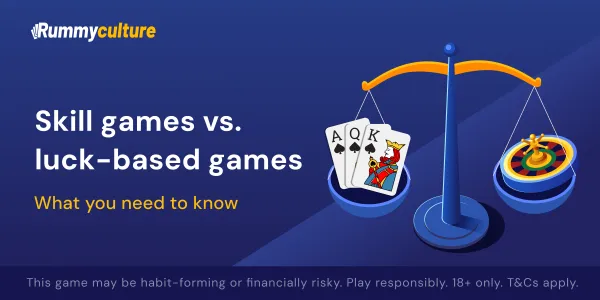- Home
- What's the Buzz
- Skill games vs. luck-based games: understanding the key differences
Skill games vs. luck-based games: understanding the key differences
As there are plenty of real money games available online, it’s important to understand the difference between skill-based and luck-based games.
RummyCulture Elite Editors | 29th May, 2025

Skill Games vs Luck-Based Games
The popularity of online gaming stems from the easy and affordable access to smartphones and the internet. Every app on a smartphone offers entertainment, social interaction and the opportunity to win real money. Understanding the concept of online gaming is simple: people learn a game, develop a skill, and start winning real money. That’s why people of all ages see the potential in a game, and they ace it.
As there are plenty of real money games available online, it’s important to understand the difference between skill-based and luck-based games. While skill-based games include strategy, practice, and decision-making, luck-based games require sheer luck.
What defines a skill-based game?
Every move in a skill-based game depends on the player’s analytical or critical thinking. To succeed in skill-based games, the player’s knowledge, decision-making and strategy play an important role.
Here are a few characteristics of a skill-based game:
- A skill-based game can only be played if there is a well-thought strategy behind every move.
- Every move in a skill-based game has the potential to influence the outcome of the game.
- Learnings from a skill-based game always help players to do better. This includes better decision making and improved techniques.
- Logical and mathematical thinking make the game more skill oriented than luck-based.
Examples of skill-based games:
Chess – Every move in the game depends on the player’s strategy and vision. No amount of luck can help players win the game.
Rummy – In this game, players are required to arrange their cards in sets and sequences while picking and discarding the cards using their analytical skills
Poker – Players are required to know the betting strategies and probabilities to play the game.
Fantasy sports – Players must have deep knowledge of players, game rules or formats, and well-known strategies or game insights.
What are luck-based games?
Each move in a luck-based game depends on the random occurrence of favourable or unfavourable outcomes, regardless of the player’s intentions. Luck holds all the power in determining the winner in these games. However, luck-based games induce excitement that can be addictive.
Examples of luck-based games:
Slot machines – In this game, players need to spin the reel to get a winning combination. No analytical or logical thinking is involved to get the favourable outcome.
Roulette – This game is played with a spinning wheel and a bouncing ball. Basically, players bet on the number, colour, or range where the ball will probably land.
Lottery: It’s a game of pure luck – starts with players getting a ticket with a certain number, hoping it will match the numbers that are drawn randomly.
Probability and randomness are two factors that define the whole concept of luck-based games. In short, when players play luck-based games, the outcomes are not in their control – entirely random and independent. Thus, it adds excitement as well as risk of losing money to the game.
Key differences between skill and luck games
The difference between skill-based and luck-based games is simple – the outcome of one is under the player’s control, while the outcome of the other is beyond it.
In most instances people lose money in luck-based games because they are playing against the house. When players play against the house, the house always has the built-in advantage that helps them ensure the profits in the long run. In contrast, when players compete against real players the platform earns money through a commission.
Here are a few pointers that can help you comprehend the differences:
| Factor | Skill-based games | Luck-based games |
| Control over the outcomes | High | Low |
| Strategic planning | Required | Not required |
| Predictability | Can be achieved | Very random |
| Learnings | High | Low |
| Analytical thinking | Required | Not required |
| Games | Chess, rummy, poker, and fantasy games | Roulette, lottery, slot machines |
Popular skill-based games in India
As India has a history of playing card games during social gatherings and festivals, skill-based games have become an important part of Indian households’ gaming culture. Here’s a list of some of the skill-based games that require decision-making, strategy, and practice:
Rummy
Players are required to form sets and sequences by picking and discarding cards on their turns. To win the game, players must have the understanding of probability and quick decision-making. Since every outcome in this game wholly depends on the well-thought decision made by the player, rummy is considered a game of skill. Rummy is popular mainly among millennials and Gen X in India.
Recommended platforms: RummyCulture, RummyTime, Rummyprime, Junglee Rummy, RummyCircle.
Chess
If we go by the simple definition of chess – it’s a board game played among two players, the winner is the one who checksmates the opponent’s king with strategic moves. Players ought to have strong foresight, memory, and pattern recognition to play this game. That’s why chess is considered a skill-based game that also helps players sharpen their cognitive skills. The game is widely popular among Gen Z, millennials, and Gen X.
Recommended platforms: chess.com, Lichess
Poker
Poker is a card game that requires players to bet, bluff, and keep an eye on the opponent’s gameplay. A player must be good at analysing the probability, quick decision-making – basically luck plays no role in a game of poker. Poker has gained popularity among young adults (ages 21–35) in metro cities of India.
Recommended platforms: PokerBaazi, Adda52
Fantasy sports
In fantasy sports gaming, players create their own virtual teams with real-life players and they get points based on their real-game performance. To ace such games, the fantasy sports player must have deep knowledge of players, game rules or formats, and well-known strategies or game insights. It’s considered the newest form of online real-money gaming and mostly popular among millennials and Gen Z sports fans.
Recommended platforms: Dream11, My11Circle, MPL Fantasy.
Popular luck-based games in India
Luck-based games are an integral part of India’s gaming culture as they are fun, entertaining, and engaging – when no money is involved. These games are easy to learn and require no skill to play.
Here is a list of the most played luck-based games in India:
Teen patti
Teen patti, also known as Indian poker, is a gambling game played with three cards. The player with the best hand who bets wins the game. It’s mostly played during family gatherings and festivals. Since it’s a game of pure luck, it’s considered gambling in many states and is illegal to play.
Andar Bahar
In Andar Bahar, the dealer randomly picks a card from the deck, the card is known as joker throughout the game. Then, two sides are created – Andar and Bahar. Then, players are required to place a bet on either side. The bet is based on which side will receive the next card that matches the rank of the joker card. The entire game is about “betting” on either the Andar or Bahar side. The winner is the one who wins most of the bets. Andar bahar is mainly played in the households of Karnataka and Maharashtra. It’s illegal to play in most states of India – especially when money is involved.
Lottery
It’s a luck-based game where players buy lottery tickets with a combination of numbers, hoping that the same combinations of numbers will be drawn for a prize. It’s legal to buy lottery tickets via government-approved sellers in states like Kerala, Maharashtra, and West Bengal. It’s quite popular among millennials and Gen X.
Is rummy a game of skill or luck?
There is always a running debate about whether rummy should be considered as a skill-based game. It’s important to note that when players play rummy they compete against real players and the platform earns money through a commission. In contrast, when players play against the house which happens in most luck-based games, the house always has the winning edge ensuring profits.
Let’s look at the common misconceptions about rummy:
- The most common misconception is that rummy is a game of luck. Many players often think that getting a good hand of cards is enough to win the game, but that’s not true. When players play a game of rummy, they are required to arrange their cards in sets and sequences, which involves decision making and a lot of mental workout.
- Many players believe that rummy doesn’t require any strategy or foresight. Contrary to popular belief, winning the game involves forming sets and sequences by carefully picking and discarding cards throughout the game.
- Some players believe that online gaming is biased towards selected winners, but RummyCulture’s IRG (Indian Rummy Grandmasters) is an ideal example of how rummy players are rewarded based on their skills. Participants go through the multiple game rounds like qualifiers, zonal, and national to win the game.
How skilled players mitigate luck through strategy
To help you understand this topic clearly, let’s use a simple example. Playing skill based money games is like playing a test cricket match. The good batsmen of the game usually leave the balls that they think are not in their favour and attack the ones that suit their skills. Similarly, real-money skill games are like a test match. It is not a scheme to get rich quickly because you do not get lucky every day.
In rummy, the best players usually drop their hand when they think they will not win a game with it. It’s like leaving a ball alone in a test match. Good players play the long game and build their bankroll slowly and steadily. You need to adjust your style of play when playing skill based games. Think of it, even the most aggressive 20-20 cricket players adapt their game to test cricket and do not go after every ball to hit a six. In rummy too, you adapt to the game, you drop some hands, you play some hands. Always remember this – “Lose small, win big”. That should be your motto for any skill-based real money game.
Legal implications in different countries
Legal restrictions on real money games depend on whether the game is skill-based or luck-based. Because luck-based games are habit forming, addictive, and entertaining at the same time, the risks involved can lead to huge money losses. Here is a brief summary explaining the legal implications in different countries regarding real money gaming:
India: Playing skill-based games like rummy is legal in India. Do note that in 1968, the Supreme Court of India declared that rummy is a game of skill. However, states of Odisha, Andhra Pradesh, Assam, Sikkim, Nagaland, Telangana, and Meghalaya currently do not allow rummy games that involve stakes.
The United States: While gambling is legal under U.S. federal law, there are significant restrictions on offline and online gambling, as each state is free to regulate or prohibit the practice within its borders.
European countries: There are numerous stances on real-money gaming, but the UK permits both skill-based and luck-based games under a strict regulatory and licensing system.
China: Gambling is illegal in China, except in two states where government-run lotteries are allowed. Regulations are much stricter for minors exposed to online gaming, they are limited to playing online games for not more than 1 hour per day on weekdays and 2 hours per day on weekends. Also, gaming is not allowed between the hours of 10 p.m. and 8 a.m.
Conclusion
It takes strategy, some amount of math skills, and an actual understanding of the game to play skill-based games. Top players know how to strategise in order to come out on top. Players can only become better at skill-based games, the more they keep playing them. In contrast, luck-based games require no skill and are played purely for entertainment.
FAQs
1. Is rummy a game of skill or chance?
2. Can you make money playing skill-based games?
3. Are luck-based games more addictive than skill games?
4. How do I improve my skills in games like rummy?
5. Are online skill games legal in India?
Featured articles









